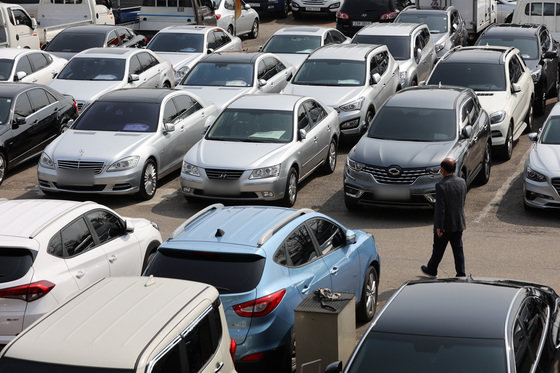The European Union (EU) has decided to ban the sale of new vehicles powered by internal combustion engines, such as petrol and diesel, from 2035. As such, it seems that the movement to eliminate internal combustion locomotives around the world to resolve the climate crisis is accelerating.
According to AFP on the 27th (local time), in addition to the EU, countries around the world, including Norway, the UK, China and the US, are currently setting deadlines for the end of sales of new internal combustion engine vehicles.
◇Norway to ban sales of new cars with internal combustion engines from 2025
The country that is taking the lead in the elimination of internal combustion locomotives is, of course, Norway. Norway will stop selling internal combustion engine vehicles from 2025, 10 years earlier than the 2035 agreed upon by the EU, and only allow sales of vehicles that do not emit carbon, such as electric vehicles and hydrogen vehicles.
In particular, Norway is the largest fossil fuel producer in Western Europe and has the highest electric vehicle penetration rate in the world. In fact, 80% of new cars sold in Norway last year were electric.
In the meantime, Norway has focused its efforts on expanding the supply of electric vehicles by imposing expensive taxes on internal combustion engine vehicles and giving tax cuts to electric vehicles. Starting with the introduction of the registration tax exemption for electric vehicles in 1990, policies such as discounts on value-added tax and possession tax, free public parking lots, and allowing operation of bus-only lanes were implemented.
◇Britain, Israel, Singapore to phase out internal combustion locomotives by 2030
The UK is the second leading country in Europe to phase out internal combustion locomotives after Norway. The British government announced in 2020 that it would ban the sale of new petrol and diesel cars from 2030, five years ahead of schedule. This is part of the ‘Green Industrial Revolution’ policy to respond to environmental changes and create 250,000 related jobs.
In addition, sales of hybrid vehicles that drive both an electric motor and an internal combustion engine will be banned from 2035. Through this, it plans to achieve the goal of ‘zero carbon’ by 2050.
Israel also announced in 2018 that it would ban the sale of new vehicles with internal combustion engines from 2030. At the time, Energy Minister Yuval Steinitz said, “We will reduce the tax on electric vehicles to almost zero, making them much cheaper (compared to internal combustion locomotives).”
Singapore had previously planned to reduce internal combustion engine vehicles by 2040 and replace them with low-carbon vehicles. However, at the 27th UN Climate Change Conference (COP27) held in November of last year, the plan was amended to ban registration of new vehicles with internal combustion engines from 2030 and set the goal of eliminating internal combustion engines by 2040.
◇The home of automobiles, the United States, is moving away from internal combustion locomotives
 Used cars for sale are parked at a used car market in downtown Seoul on the 5th. 2022.4.5/News1 ⓒ News1
Used cars for sale are parked at a used car market in downtown Seoul on the 5th. 2022.4.5/News1 ⓒ News1 In the United States, the home of automobiles, the movement to phase out internal combustion locomotives is spreading. New York State plans to ban the sale of internal combustion engine vehicles by 2035. California is also pushing a bill to ban the sale of vehicles with internal combustion engines starting in 2035.
It also provides an annual target for the percentage of zero-emission vehicles automakers must sell in the state. It plans to start at 35% in 2026, increase it sequentially to 68% by 2030 and 100% by 2035.
Across the country, President Joe Biden has announced his own goal of turning half of U.S. car sales into zero-emissions by 2030.
In particular, in accordance with the Inflation Reduction Act (IRA) introduced last year, subsidies of up to $7,500 (approximately 10 million won) will be provided to electric vehicles that are assembled in the United States and meet the requirements related to core minerals and batteries.
◇Korea, China, and Japan aim to phase out internal combustion locomotives by the 2030s
China, which leads the global electric vehicle battery market, also joined in the withdrawal of internal combustion engine vehicles. Chinese authorities have announced that by 2035, 50% of new cars sold in China will be electric and the remaining 50% will be hybrids.
There are also independent movements to phase out internal combustion locomotives in various parts of China. Hainan Province in southern China has announced that it will ban the sale of petrol and diesel vehicles from 2030 and offer tax cuts for the purchase of electric vehicles.
It is known that Japan, a powerhouse in automobiles, will ban sales of new vehicles with internal combustion engines, excluding hybrid vehicles, by the 2030s. In the case of Korea, it has set a goal of eliminating internal combustion engine vehicles by 2035 by expanding the supply of zero-emission vehicles such as electric vehicles and hydrogen vehicles.
Source: Donga
Mark Jones is a world traveler and journalist for News Rebeat. With a curious mind and a love of adventure, Mark brings a unique perspective to the latest global events and provides in-depth and thought-provoking coverage of the world at large.